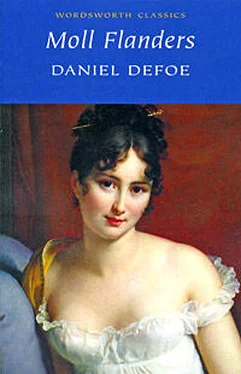I did not understand anything of that; but I answered, 'I am sure they call her madam, and she does not go to service nor do housework'; and therefore I insisted that she was a gentlewoman, and I would be such a gentlewoman as that.
The ladies were told all this again, to be sure, and they made themselves merry with it, and every now and then the young ladies, Mr. Mayor's daughters, would come and see me, and ask where the little gentlewoman was, which made me not a little proud of myself.
This held a great while, and I was often visited by these young ladies, and sometimes they brought others with them; so that I was known by it almost all over the town.
I was now about ten years old, and began to look a little womanish, for I was mighty grave and humble, very mannerly, and as I had often heard the ladies say I was pretty, and would be a very handsome woman, so you may be sure that hearing them say so made me not a little proud. However, that pride had no ill effect upon me yet; only, as they often gave me money, and I gave it to my old nurse, she, honest woman, was so just to me as to lay it all out again for me, and gave me head–dresses, and linen, and gloves, and ribbons, and I went very neat, and always clean; for that I would do, and if I had rags on, I would always be clean, or else I would dabble them in water myself; but, I say, my good nurse, when I had money given me, very honestly laid it out for me, and would always tell the ladies this or that was bought with their money; and this made them oftentimes give me more, till at last I was indeed called upon by the magistrates, as I understood it, to go out to service; but then I was come to be so good a workwoman myself, and the ladies were so kind to me, that it was plain I could maintain myself—that is to say, I could earn as much for my nurse as she was able by it to keep me—so she told them that if they would give her leave, she would keep the gentlewoman, as she called me, to be her assistant and teach the children, which I was very well able to do; for I was very nimble at my work, and had a good hand with my needle, though I was yet very young.
But the kindness of the ladies of the town did not end here, for when they came to understand that I was no more maintained by the public allowance as before, they gave me money oftener than formerly; and as I grew up they brought me work to do for them, such as linen to make, and laces to mend, and heads to dress up, and not only paid me for doing them, but even taught me how to do them; so that now I was a gentlewoman indeed, as I understood that word, I not only found myself clothes and paid my nurse for my keeping, but got money in my pocket too beforehand.
The ladies also gave me clothes frequently of their own or their children's; some stockings, some petticoats, some gowns, some one thing, some another, and these my old woman managed for me like a mere mother, and kept them for me, obliged me to mend them, and turn them and twist them to the best advantage, for she was a rare housewife.
At last one of the ladies took so much fancy to me that she would have me home to her house, for a month, she said, to be among her daughters.
Now, though this was exceeding kind in her, yet, as my old good woman said to her, unless she resolved to keep me for good and all, she would do the little gentlewoman more harm than good. 'Well,' says the lady, 'that's true; and therefore I'll only take her home for a week, then, that I may see how my daughters and she agree together, and how I like her temper, and then I'll tell you more; and in the meantime, if anybody comes to see her as they used to do, you may only tell them you have sent her out to my house.'
This was prudently managed enough, and I went to the lady's house; but I was so pleased there with the young ladies, and they so pleased with me, that I had enough to do to come away, and they were as unwilling to part with me.
However, I did come away, and lived almost a year more with my honest old woman, and began now to be very helpful to her; for I was almost fourteen years old, was tall of my age, and looked a little womanish; but I had such a taste of genteel living at the lady's house that I was not so easy in my old quarters as I used to be, and I thought it was fine to be a gentlewoman indeed, for I had quite other notions of a gentlewoman now than I had before; and as I thought, I say, that it was fine to be a gentlewoman, so I loved to be among gentlewomen, and therefore I longed to be there again.
About the time that I was fourteen years and a quarter old, my good nurse, mother I rather to call her, fell sick and died. I was then in a sad condition indeed, for as there is no great bustle in putting an end to a poor body's family when once they are carried to the grave, so the poor good woman being buried, the parish children she kept were immediately removed by the church–wardens; the school was at an end, and the children of it had no more to do but just stay at home till they were sent somewhere else; and as for what she left, her daughter, a married woman with six or seven children, came and swept it all away at once, and removing the goods, they had no more to say to me than to jest with me, and tell me that the little gentlewoman might set up for herself if she pleased.
I was frighted out of my wits almost, and knew not what to do, for I was, as it were, turned out of doors to the wide world, and that which was still worse, the old honest woman had two–and–twenty shillings of mine in her hand, which was all the estate the little gentlewoman had in the world; and when I asked the daughter for it, she huffed me and laughed at me, and told me she had nothing to do with it.
It was true the good, poor woman had told her daughter of it, and that it lay in such a place, that it was the child's money, and had called once or twice for me to give it me, but I was, unhappily, out of the way somewhere or other, and when I came back she was past being in a condition to speak of it. However, the daughter was so honest afterwards as to give it me, though at first she used me cruelly about it.
Now was I a poor gentlewoman indeed, and I was just that very night to be turned into the wide world; for the daughter removed all the goods, and I had not so much as a lodging to go to, or a bit of bread to eat. But it seems some of the neighbours, who had known my circumstances, took so much compassion of me as to acquaint the lady in whose family I had been a week, as I mentioned above; and immediately she sent her maid to fetch me away, and two of her daughters came with the maid though unsent. So I went with them, bag and baggage, and with a glad heart, you may be sure. The fright of my condition had made such an impression upon me, that I did not want now to be a gentlewoman, but was very willing to be a servant, and that any kind of servant they thought fit to have me be.
But my new generous mistress, for she exceeded the good woman I was with before, in everything, as well as in the matter of estate; I say, in everything except honesty; and for that, though this was a lady most exactly just, yet I must not forget to say on all occasions, that the first, though poor, was as uprightly honest as it was possible for any one to be.
I was no sooner carried away, as I have said, by this good gentlewoman, but the first lady, that is to say, the Mayoress that was, sent her two daughters to take care of me; and another family which had taken notice of me when I was the little gentlewoman, and had given me work to do, sent for me after her, so that I was mightily made of, as we say; nay, and they were not a little angry, especially madam the Mayoress, that her friend had taken me away from her, as she called it; for, as she said, I was hers by right, she having been the first that took any notice of me. But they that had me would not part with me; and as for me, though I should have been very well treated with any of the others, yet I could not be better than where I was.
Читать дальше
Конец ознакомительного отрывка
Купить книгу












